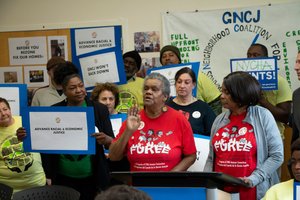NYCHA Capital Needs Must be Addressed as part of Gowanus Rezoning

In a push to right the imbalance between the needs of longtime residents of the Gowanus community and more privileged voices and real estate interests, the Gowanus Neighborhood Coalition for Justice (GNCJ) today declared their demands for the long anticipated rezoning of Gowanus. In response to the City’s draft zoning proposal, the diverse coalition of South Brooklyn public housing residents and advocates organized in an effort to ensure a just and equitable rezoning that benefits the neighborhoods most vulnerable and impacted members instead of deepening existing inequality.
As the Gowanus Rezoning approaches the start of its official public review process, GNCJ outlined what must be included and committed to by the City before the rezoning can be approved. At the top of the Coalition’s demands are:
- Upfront funding to address the full capital needs of local New York City Housing Authority (NYCHA) developments: Warren Street Houses, Wyckoff Gardens and Gowanus House
- Ensuring net zero combined sewage overflow (CSO) from all new developments
- Creation of the city’s first Environmental Justice Special District with a powerful and local oversight board to track and implement innovative sustainable projects.
NYCHA is the largest affordable housing provider in the neighborhood and mainly houses Black and Latinx residents, with Gowanus Houses, Wyckoff Gardens and Warren Street home to 25% of renter households in the neighborhood.
A recent report by Churches United for Fair Housing (CUFFH) highlighted how Gowanus and the adjacent Park Slope neighborhood has seen a 30% and 20% decrease in Latinx and Black residents since the 2003 Park Slope Rezoning. While communities of color in the neighborhood were pushed out after the rezoning, New Yorkers living in Gowanus public housing have been able to stay in their homes. However, if the Mayor allows public housing to continue deteriorating, there is a real risk of residents being displaced.
Despite this crisis and despite three years of Coalition members engaging with the City to demand funding for NYCHA, the City has not meaningfully linked strategies to preserve public housing and address the $312 million 5-year capital funding need as part of the Gowanus rezoning. Meanwhile, our report Public Action, Public Value, found that the neighborhood rezoning could generate up to $1.3 billion in additional land value, some of which could be recovered to address the capital funding need at local public housing developments.
In addition to their top demands, the Coalition laid out its complete list of priorities to ensure the rezoning truly benefits the community. These include commitments for deeper affordable housing that serve residents who need it most; investing in social resilience and economic opportunities; and protecting and investing in industry and art.
Pratt Center is continuing to work closely to support the advocacy and priorities of GNCJ, and to help them develop innovative ways to address these issues.
This is a chance for the City to get things right in Gowanus, but it must take the demands of the Coalition seriously and work with them to ensure the rezoning is in the best interest of the entire community.